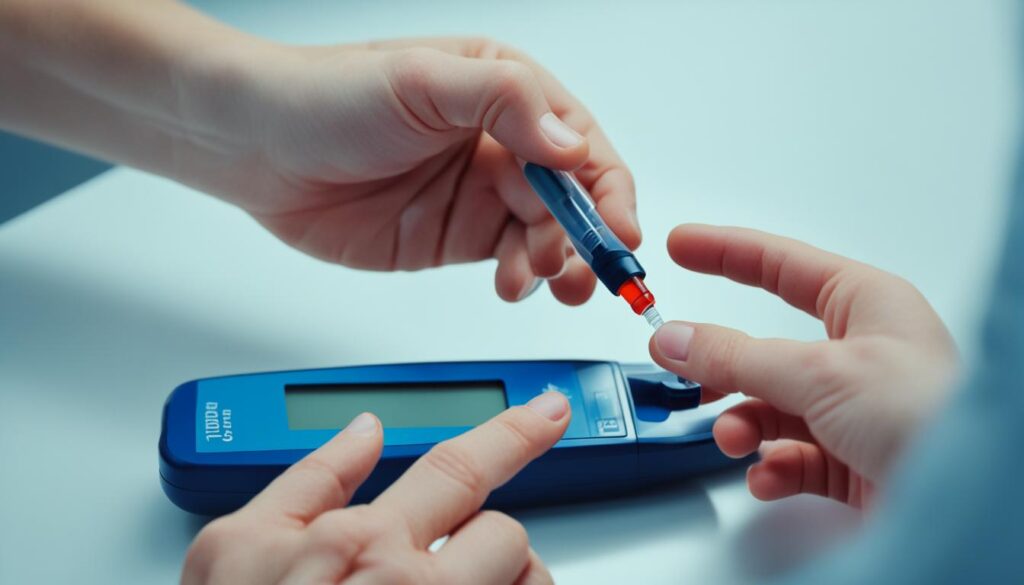Are you tired of battling unpredictable blood sugar levels and the relentless demands of diabetes management? It’s time to take control and pave the way for a healthier life. But where do you start?
In this comprehensive guide, we will provide you with practical tips and strategies to effectively manage diabetes and improve your overall well-being. From understanding the impact of diabetes on your health to creating a balanced diabetic diet and incorporating exercise into your routine, we’ve got you covered.
Get ready to break free from the shackles of diabetes and embark on a journey towards a healthier, more fulfilling life. Are you ready to join the millions of individuals who have successfully managed their diabetes and reclaimed their vitality?
Key Takeaways:
- Learn effective tips and strategies for managing diabetes
- Understand the impact of diabetes on your health
- Create a balanced diabetic diet for optimal blood sugar control
- Incorporate exercise into your routine for diabetes management
- Discover the emotional side of diabetes and how to cope with it
Understanding Diabetes and Its Impact on Health
Diabetes is a complex condition that affects millions of people worldwide. It is essential to understand the different types of diabetes and how they can impact a person’s health. By gaining a comprehensive understanding of diabetes, its symptoms, and potential complications, individuals can take proactive steps to manage the condition effectively.
Diabetes symptoms can vary depending on the type of diabetes a person has. Common symptoms include frequent urination, increased thirst, unexplained weight loss, fatigue, and blurred vision. These indicators may develop gradually, making it crucial to recognize and address them promptly.
When left unmanaged, diabetes can lead to various complications that can significantly impact an individual’s health. Diabetes complications can affect multiple organs and systems in the body, including the heart, blood vessels, eyes, kidneys, and nerves. Some potential complications include:
- Cardiovascular disease
- Stroke
- Kidney disease
- Eye problems
- Foot complications
- Nerve damage
To minimize the risk of developing these complications, it is vital for individuals with diabetes to actively manage their condition. This involves maintaining healthy blood sugar levels, adhering to a balanced diet, engaging in regular physical activity, and following the prescribed treatment plan provided by healthcare professionals.
By understanding diabetes, its impact on health, and the potential complications it can cause, individuals can make informed decisions and take proactive steps to maintain their well-being. With proper management, individuals with diabetes can lead fulfilling and healthy lives.
Diabetes
Diabetes is a chronic condition that affects millions of people worldwide. It is characterized by high levels of blood sugar, also known as glucose, which can lead to various health complications if not properly managed. There are different types of diabetes, each requiring specific approaches to treatment and care. In this section, we will explore the essentials of managing type 1 diabetes, strategies for blood sugar regulation in type 2 diabetes, and the importance of protecting both mother and child in cases of gestational diabetes.
Type 1 Diabetes: Insulin Management Essentials
Type 1 diabetes is an autoimmune disease where the body attacks the insulin-producing cells in the pancreas. Insulin is a hormone necessary for the regulation of blood sugar levels. Individuals with type 1 diabetes require lifelong insulin therapy to keep their blood sugar within a target range.
Insulin management is crucial for individuals with type 1 diabetes. It involves administering insulin through injections or an insulin pump, monitoring blood sugar levels regularly, and adjusting insulin doses as needed. Maintaining a balanced diet, engaging in regular physical activity, and working closely with healthcare professionals are also essential for effective diabetes management.

Type 2 Diabetes: Strategies for Blood Sugar Regulation
Type 2 diabetes is the most common form of diabetes and is often associated with lifestyle factors such as poor diet, lack of physical activity, and obesity. Individuals with type 2 diabetes can still produce insulin, but their bodies may not use it effectively.
Effective management of type 2 diabetes involves adopting healthy lifestyle habits. This includes following a balanced diet, engaging in regular exercise, maintaining a healthy body weight, and monitoring blood sugar levels closely. Medications or insulin therapy may also be prescribed by healthcare professionals to help control blood sugar levels.
Gestational Diabetes: Protecting Mother and Child
Gestational diabetes occurs during pregnancy and can increase the risk of complications for both the mother and the baby. It is characterized by high blood sugar levels that develop during pregnancy and may resolve after childbirth.
Managing gestational diabetes involves close monitoring of blood sugar levels, following a healthy diet plan, and engaging in regular physical activity as advised by healthcare professionals. It is crucial to work closely with a healthcare team to ensure the well-being of both mother and child.
Diabetes, whether it’s type 1, type 2, or gestational diabetes, requires careful management to maintain optimal blood sugar control and prevent complications. Understanding the specific needs and strategies for each type of diabetes is essential for leading a healthy and fulfilling life with diabetes.
Creating a Balanced Diabetic Diet
When it comes to managing diabetes, a balanced diet plays a crucial role in maintaining blood sugar control and promoting overall health. By making informed food choices and focusing on portion control, individuals with diabetes can improve their well-being and enjoy a healthier life.
So, how can you create a diabetic diet that is both enjoyable and nourishing? Here are some tips and guidelines to get started:
- Choose nutrient-dense foods: Opt for foods that are rich in essential nutrients like vitamins, minerals, and fiber. Include plenty of fruits, vegetables, whole grains, lean proteins, and healthy fats in your meals.
- Monitor carbohydrate intake: Carbohydrates can significantly impact blood sugar levels. It’s essential to be mindful of the types and amounts of carbohydrates you consume. Focus on carbohydrates with a low glycemic index, such as whole grains, legumes, and non-starchy vegetables.
- Practice portion control: Controlling portion sizes is key to maintaining blood sugar control. Use measuring cups, a food scale, or visual references to ensure you’re consuming appropriate portions of different food groups.
- Balance macronutrients: Incorporate a mix of carbohydrates, proteins, and fats into your meals. This balance can help stabilize blood sugar levels and provide sustained energy throughout the day.
- Stay hydrated: Drinking an adequate amount of water is vital for overall health and blood sugar control. Aim to drink at least eight glasses of water per day and limit sugary beverages.
Remember, managing diabetes doesn’t mean sacrificing taste or enjoyment. There are plenty of delicious and satisfying options available that can fit into a balanced diabetic diet. Be creative with your meal planning, try new recipes, and don’t hesitate to seek guidance from a registered dietitian.
By adopting a balanced diabetic diet, you can take control of your blood sugar levels and pave the way for a healthier future.
Exercising for Diabetes Control and Prevention
Incorporating regular physical activity into your routine is crucial for managing and preventing diabetes. Exercise plays a significant role in controlling blood sugar levels, improving overall fitness, and enhancing your overall well-being. By pairing exercise with proper nutrition, you can optimize blood sugar management and lead a healthier life with diabetes.
Why Physical Activity Is Critical in Diabetes Management
Physical activity is essential for individuals with diabetes, as it offers numerous benefits for blood sugar control and overall health. Engaging in regular exercise helps your body use insulin more efficiently, enabling better blood sugar management. Additionally, exercise can aid in weight management, improve cardiovascular health, and reduce the risk of developing complications associated with diabetes.
Finding Your Fitness: Exercise Options for Every Level
Regardless of your fitness level, there are exercise options available to suit your needs and abilities. From low-impact activities like walking and swimming to more rigorous workouts like running or weightlifting, finding an exercise routine that you enjoy and can stick with is key. Consider incorporating a combination of aerobic exercises, strength training, and flexibility exercises into your weekly routine to maximize the benefits of physical activity.
Pairing Exercise with Nutrition for Optimal Blood Sugar Management
Exercise and proper nutrition go hand in hand when it comes to managing blood sugar levels effectively. Before exercising, it’s essential to ensure that your blood sugar is within a safe range. You may need to make adjustments to your nutrition plan or consult with a healthcare professional to determine the best strategy for managing your blood sugar during exercise. By fueling your body with the right nutrients before and after physical activity, you can support optimal blood sugar management and enhance your performance.
Managing Blood Sugar Levels to Prevent Complications
One of the most crucial aspects of diabetes management is maintaining optimal blood sugar levels. Proper blood sugar control plays a pivotal role in preventing diabetes complications and ensuring a healthier life. Uncontrolled blood sugar can lead to a range of complications that can significantly impact an individual’s well-being.
“Managing blood sugar levels is like fine-tuning a complex instrument. It requires careful attention and consistent effort to keep the balance just right.”
With diabetes, high blood sugar levels can damage various organs and systems in the body over time, including the heart, kidneys, eyes, and nerves. This can lead to serious complications such as cardiovascular disease, kidney disease, diabetic retinopathy, neuropathy, and even amputation.
On the other hand, consistently low blood sugar levels can result in hypoglycemia, which can cause dizziness, confusion, seizures, and in severe cases, loss of consciousness. Therefore, striking a balance and managing blood sugar levels within the target range is crucial to prevent both high and low blood sugar-related complications.
To effectively manage blood sugar levels and reduce the risk of complications, here are some practical tips:
- Eat a balanced diet: Focus on wholesome foods that are rich in nutrients and low in added sugars. Incorporate a variety of fruits, vegetables, whole grains, lean proteins, and healthy fats into your meals.
- Monitor your blood sugar: Regularly check your blood sugar levels as recommended by your healthcare provider. This will help you understand how your body responds to different foods, activities, and medications, enabling you to make informed decisions.
- Take medication as prescribed: If you are on diabetes medication or insulin therapy, it is essential to take them according to your healthcare provider’s instructions. Consistency and adherence to the prescribed regimen are key to maintaining stable blood sugar levels.
- Engage in regular physical activity: Exercise has numerous benefits for diabetes management, including improved insulin sensitivity and blood sugar control. Aim for at least 150 minutes of moderate-intensity aerobic exercise, such as brisk walking or cycling, every week.
- Manage stress: Stress can affect blood sugar levels, so finding healthy ways to manage stress is crucial. Engage in relaxation techniques such as deep breathing exercises, mindfulness, yoga, or engaging in activities you enjoy.
- Get enough sleep: Lack of sleep can disrupt blood sugar control, so prioritize getting adequate restful sleep each night. Aim for 7-8 hours of uninterrupted sleep for optimal health.
By following these tips and strategies, you can effectively manage your blood sugar levels and reduce the risk of diabetes complications. Remember, prevention is key when it comes to preserving your health and well-being with diabetes.
Take control of your blood sugar and pave the way to a healthier and happier life!

Navigating Diabetes Treatment: Medications and Monitoring
When it comes to managing diabetes, it’s essential to understand the various aspects of treatment, including medications and monitoring. Effective diabetes management involves a combination of medication, lifestyle changes, and regular monitoring of blood sugar levels. By taking the right medications and staying on top of your glucose levels, you can keep your diabetes under control and minimize the risk of complications.
Insulin and Oral Medications: How They Work Together
Diabetes treatment often involves a combination of insulin and oral medications, depending on the type of diabetes and individual needs. Insulin is a hormone that helps regulate blood sugar levels. People with type 1 diabetes, who do not produce insulin, typically require insulin injections. On the other hand, individuals with type 2 diabetes may be able to manage their condition with oral medications that help the body use insulin more efficiently or reduce glucose production.
“Finding the right balance between insulin and oral medications is crucial in diabetes management. It’s important to work closely with your healthcare provider to determine the appropriate medication regimen for your specific needs.”
Insulin and oral medications complement each other in controlling blood sugar levels. Insulin, when injected or delivered through an insulin pump, ensures that there is enough insulin in the body to regulate glucose effectively. Oral medications, on the other hand, can help improve insulin sensitivity or reduce glucose production in the liver.
Self-Checking Your Glucose: When and How Often
Monitoring your blood sugar levels regularly is an essential part of diabetes management. Self-checking your glucose allows you to understand how your body responds to various factors such as medications, meals, exercise, and stress. By keeping track of your blood sugar levels, you can make informed decisions about your diabetes treatment plan.
When it comes to self-checking, the frequency and timing depend on individual circumstances and the advice of your healthcare provider. In general, people with diabetes may need to check their glucose levels multiple times a day, especially if they take insulin. This helps ensure that blood sugar levels are within the target range and adjustments to medications can be made if necessary. Self-checking your glucose may involve using a glucose meter to measure your blood sugar directly or using a continuous glucose monitoring system that provides real-time readings throughout the day.
Common Types of Diabetes Medications
| Type of Medication | How It Works | Examples |
|---|---|---|
| Metformin | Reduces glucose production in the liver and increases insulin sensitivity | Glucophage, Fortamet |
| Sulfonylureas | Stimulates the pancreas to produce more insulin | Glipizide, Glyburide |
| Thiazolidinediones | Improves insulin sensitivity and decreases glucose production | Pioglitazone, Rosiglitazone |
| DPP-4 Inhibitors | Reduces blood sugar by preventing the breakdown of incretin hormones | Sitagliptin, Saxagliptin |
| SGLT2 Inhibitors | Helps the kidneys excrete excess glucose through urine | Canagliflozin, Dapagliflozin |
The table above provides a brief overview of some common types of diabetes medications. It’s important to note that these medications may have different brand names and variations, so it’s crucial to consult with your healthcare provider to determine which medication is best for you.
Emerging Research and Future Treatments in Diabetes
The field of diabetes research continues to advance, bringing hope for improved treatments and management strategies for individuals living with diabetes. Ongoing studies and medical advancements are paving the way for a brighter future in diabetes care.
Researchers are constantly exploring new avenues to better understand diabetes and develop innovative treatments. The goal is not only to improve the quality of life for individuals with diabetes but also to find methods for preventing the onset of the condition.

One area of diabetes research focuses on the development of advanced insulin therapies. Scientists are working on creating insulin formulations that offer more precise control over blood sugar levels and reduce the risk of severe hypoglycemia. These advancements in insulin treatments aim to provide individuals with diabetes greater flexibility and stability in managing their condition.
In addition to insulin therapies, researchers are exploring alternative treatment options, such as the use of artificial pancreas systems. These systems combine continuous glucose monitoring with automated insulin delivery, creating a closed-loop system for real-time blood sugar regulation. Artificial pancreas systems have shown promising results in clinical trials and have the potential to revolutionize diabetes management.
Another area of focus in diabetes research is the development of regenerative therapies. Scientists are investigating ways to regenerate damaged pancreatic cells and restore their ability to produce insulin. By harnessing the power of stem cells and regenerative medicine, researchers aim to provide a long-term solution for individuals with diabetes, potentially eliminating the need for daily insulin injections.
Furthermore, technological advancements are playing a significant role in diabetes research. Innovations in wearable devices, mobile applications, and artificial intelligence have the potential to revolutionize diabetes self-management and improve treatment outcomes. These technologies can track blood sugar levels, provide real-time feedback, and offer personalized recommendations for diet and exercise, empowering individuals to take control of their diabetes.
As Dr. Jane Johnson, a leading diabetes researcher, asserts, “The future of diabetes care lies in the integration of cutting-edge research and advancements in technology. With an interdisciplinary approach, we can transform the lives of individuals with diabetes and create a world where diabetes is not only manageable but preventable.”
The efforts in diabetes research are driven by the desire to enhance the lives of millions of people affected by diabetes worldwide. As medical advancements continue to emerge, individuals with diabetes can look forward to a future with improved treatments, manageable glucose control, and greater overall well-being.
Dealing with the Emotional Side of Diabetes
Living with diabetes can bring about a range of emotional challenges that go beyond the physical aspects of the condition. It’s important to address the emotional side of diabetes and develop strategies to manage stress effectively. Stress management techniques tailored specifically for diabetics can play a crucial role in promoting overall well-being and improving diabetes self-care.
Stress Management Techniques Tailored for Diabetics
Managing stress is vital for individuals with diabetes, as stress can impact blood sugar levels and overall health. Here are some stress management techniques that are tailored to meet the specific needs of diabetics:
- Regular physical activity: Exercise is not only beneficial for physical health but also for reducing stress. Engaging in regular physical activity can help release endorphins, improve mood, and reduce stress levels.
- Mindfulness and relaxation techniques: Practicing mindfulness, meditation, deep breathing, and other relaxation techniques can help alleviate stress. These techniques promote a sense of calmness and can be integrated into daily routines to manage stress effectively.
- Healthy eating habits: Proper nutrition plays a significant role in stress management. Eating a well-balanced diet that includes whole foods, fruits, vegetables, and lean proteins helps support overall health and can help stabilize blood sugar levels, reducing stress associated with fluctuations in blood sugar.
Leveraging Support Systems: Finding Help and Community
Building and leveraging support systems is crucial for individuals living with diabetes. Finding help and nurturing connections within the diabetes community can provide emotional support and inspire a sense of belonging. Here are some ways to leverage support systems:
- Joining diabetes support groups: Local support groups or online communities can provide a safe space to connect with others who understand the challenges of living with diabetes. Sharing experiences, advice, and knowledge can help individuals cope with the emotional burden of diabetes.
- Seeking professional help: In challenging times, it may be beneficial to seek guidance from mental health professionals who specialize in diabetes care. They can provide individualized support and help develop strategies to manage stress and improve overall emotional well-being.
- Engaging family and friends: Sharing concerns and seeking assistance from loved ones can help create a strong support network. Communicating the emotional impact of diabetes can foster understanding, empathy, and a sense of shared responsibility for managing the condition.
By addressing the emotional side of diabetes and integrating stress management techniques into daily life, individuals with diabetes can cultivate a healthier mindset and enhance their overall well-being.

Conclusion
In conclusion, managing diabetes is essential for living a healthier life. Throughout this article, we have explored various tips and strategies for effectively managing blood sugar levels and overall diabetes care. It is crucial to remember that with the right approach and lifestyle choices, individuals with diabetes can lead fulfilling and empowered lives.
By understanding the fundamentals of diabetes and its impact on health, individuals can recognize the symptoms and potential complications associated with this condition. Whether it’s type 1 diabetes, type 2 diabetes, or gestational diabetes during pregnancy, proper management is key to minimizing risks and ensuring the well-being of both mother and child.
A balanced diabetic diet and regular exercise are two cornerstones of diabetes management. Implementing a well-rounded meal plan that focuses on portion control and incorporates a variety of nutrients can help regulate blood sugar levels. Pairing exercise with proper nutrition optimizes blood sugar management and promotes overall health. Furthermore, managing blood sugar levels diligently can prevent the development of long-term complications.
Diabetes treatment often involves medication and regular monitoring. Understanding how insulin and oral medications work together is crucial, as is self-checking glucose levels at appropriate intervals. Staying up to date with emerging research and future treatments can provide hope for improved diabetes management in the future.
Lastly, managing the emotional side of diabetes is equally important. Stress management techniques tailored for diabetics and leveraging support systems and finding a supportive community can help individuals cope with the challenges of living with diabetes.
Remember, managing diabetes is a journey, and each step you take towards a healthier life is significant. With the right strategies and mindset, you can seize control of your diabetes and lead a fulfilling and empowered life. Stay motivated, informed, and never hesitate to seek support from healthcare professionals, support groups, and loved ones.









